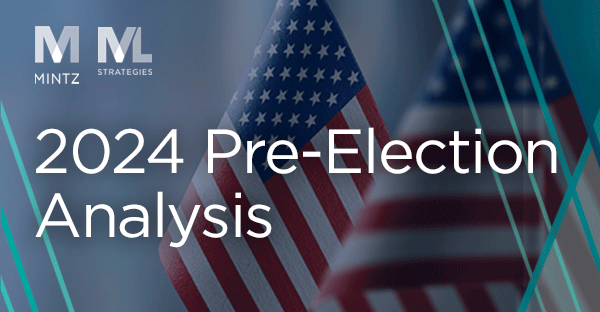
ML Strategies
Viewpoints
Filter by:
NIST Releases Updated Draft Guidance for Federal Agencies’ Use of AI in Identity Verification Systems — AI: The Washington Report
September 12, 2024 | Article | By Bruce Sokler, Alexander Hecht, Christian Tamotsu Fjeld, Matthew Tikhonovsky
Read about the second draft guidance released by the National Institute of Standards and Technology (NIST) in the latest edition of AI: The Washington Report, a joint undertaking of Mintz and ML Strategies covering potential federal legislative, executive, and regulatory activities related to AI.
Pre-Election Analysis: International Trade
September 9, 2024 | Advisory | By R. Neal Martin, Frank C. Guinta, Myria S. Garcia
Read about international trade priorities that may be pursued by the presidential candidates Donald Trump and Kamala Harris in the latest edition of our 2024 Pre-Election Analysis series on how the November 2024 election will impact the legislative and regulatory landscape.
Senator Rounds (R-SD) Unveils Five AI Bills for Congress to Consider After August Recess — AI: The Washington Report
September 5, 2024 | Article | By Bruce Sokler, Alexander Hecht, Christian Tamotsu Fjeld, Matthew Tikhonovsky
Read about five AI bills Senator Mike Rounds (R-SD) introduced for Congress to consider when its members return on September 8 in the latest edition of AI: The Washington Report, a joint undertaking of Mintz and ML Strategies covering potential federal legislative, executive, and regulatory activities related to AI.
FDA Continues to Intentionally Incorporate AI into Medical Product Development with Its Establishment of a New Internal Advisory Body
September 4, 2024 | Blog | By Joanne Hawana , Benjamin Zegarelli
Agencies across the federal government continue to grapple with how to respond to the directives in President Biden’s October 2023 executive order on artificial intelligence, including the Food and Drug Administration (FDA) and its parent agency the Department of Health and Human Services (DHHS). As summarized in this handy Mintz/ML Strategies timeline of the actions set forth in President Biden’s AI executive order, DHHS has a mandate to “develop a strategy for regulating the use of AI in the drug development process” and a deadline of October 29, 2024 to meet that obligation. Notably, earlier this year DHHS announced a functional reorganization within the department that included creating the position of Chief AI Officer in response to the presidential order.
A Preview of AI Priorities Under the Next Presidential Administration — AI: The Washington Report
August 29, 2024 | Alert | By Bruce Sokler, Alexander Hecht, Christian Tamotsu Fjeld, Matthew Tikhonovsky
Read about the AI priorities of both presidential candidates and their likely actions if they take office in the latest edition of AI: The Washington Report, a joint undertaking of Mintz and ML Strategies covering potential federal legislative, executive, and regulatory activities related to AI.
2024 Pre-Election Analysis: Health Care Issues
August 26, 2024 | Advisory | By Alexander Hecht, Matthew Tikhonovsky, Daniel Cody
Read about different health care priorities that may be pursued by the presidential candidates Donald Trump and Kamala Harris in the latest edition of our 2024 Pre-Election Analysis series on how the November 2024 election will impact the legislative and regulatory landscape.
FTC Cracks Down on AI-Generated Fake Reviews – AI: The Washington Report
August 22, 2024 | Article | By Bruce Sokler, Alexander Hecht, Christian Tamotsu Fjeld, Matthew Tikhonovsky
Read about an FTC final rule banning fake reviews and testimonials, which takes effect in October, in the latest edition of AI: The Washington Report, a joint undertaking of Mintz and ML Strategies covering potential federal legislative, executive, and regulatory activities related to AI.
CMS Issues Final Notice on Program for Breakthrough Device Reimbursement but Industry Looks to Congress for More Inclusive Solution
August 19, 2024 | Blog | By Benjamin Zegarelli, Joanne Hawana , Anthony DeMaio, Pamela Mejia
Obtaining Medicare coverage and reimbursement for medical devices is notoriously more difficult than for drugs or biologics, and any progress on expanding coverage pathways has been agonizingly slow for industry stakeholders. An announcement on August 7, 2024 by the Centers for Medicare and Medicaid Services (CMS) of a final notice for the Transitional Coverage for Emerging Technologies (TCET) pathway was therefore a welcome development. However, digging under the surface of the TCET pathway uncovers some less than thrilling details. CMS’s failure to address stakeholder proposals to modify the TCET program has increased interest and advocacy around Congress’s consideration of the Ensuring Patient Access to Critical Breakthrough Products Act. We explore both the shortcomings of the TCET pathway and the possible legislative solutions to its perceived gaps below.
2024 Pre-Election Analysis: Tax Issues
August 19, 2024 | Advisory | By R. Neal Martin, Alexander Hecht, Frank C. Guinta, Myria S. Garcia
Read about key tax policy proposals put forth by presidential candidates Donald Trump and Kamala Harris and what to expect on Capitol Hill from key leaders on tax policy in the 119th Congress in the latest edition of our 2024 Pre-Election Analysis series on how the November 2024 election will impact the legislative and regulatory landscape.
Senate Commerce Committee Advances 10 AI Bills – AI: The Washington Report
August 14, 2024 | Article | By Bruce Sokler, Alexander Hecht, Christian Tamotsu Fjeld, Matthew Tikhonovsky
Read about 10 AI-related bills recently advanced by the Senate Commerce Committee for consideration in the full Senate in the latest edition of AI: The Washington Report, a joint undertaking of Mintz and ML Strategies covering potential federal legislative, executive, and regulatory activities related to AI.
2024 Pre-Election Analysis: US-Canada Cross-Border Issues
August 12, 2024 | Advisory | By R. Neal Martin, Myria S. Garcia, Matthew T. Simpson
Read about some of the most pressing cross-border issues that will be tackled by the next administration and 119th Congress in the second edition of our 2024 Pre-Election Analysis series on how the November 2024 election will impact the legislative and regulatory landscape in a variety of areas.
FDA and CTTI Hold Joint Workshop on AI in Drug Development – AI: The Washington Report
August 9, 2024 | Article | By Benjamin Zegarelli, Joanne Hawana , Matthew Tikhonovsky
Read about the Food and Drug Administration (FDA) and the Clinical Trials Transformation Initiative (CTTI) joint workshop in the latest edition of AI: The Washington Report, a joint undertaking of Mintz and ML Strategies covering potential federal legislative, executive, and regulatory activities related to AI.
2024 Pre-Election Analysis: Energy and Sustainability
August 5, 2024 | Advisory | By John Lushetsky, R. Neal Martin, Myria S. Garcia
Read about how the outcome of the presidential election could impact energy and sustainability policy in the inaugural edition of our 2024 Pre-Election Analysis series on how the November 2024 election will impact the legislative and regulatory landscape in a variety of areas.
Top Competition Enforcers in the US, EU, and UK Release Joint Statement on AI Competition – AI: The Washington Report
August 2, 2024 | | By Bruce Sokler, Alexander Hecht, Christian Tamotsu Fjeld, Matthew Tikhonovsky
Read about the joint statement on competition in generative AI foundation models and AI products in the latest edition of AI: The Washington Report, a joint undertaking of Mintz and ML Strategies covering potential federal legislative, executive, and regulatory activities related to AI.
Bipartisan Group of Senators Introduce Bill to Address AI Deepfakes and Protect Intellectual Property – AI: The Washington Report
July 17, 2024 | | By Bruce Sokler, Alexander Hecht, Christian Tamotsu Fjeld, Matthew Tikhonovsky
Read about a bill introduced by a bipartisan group of senators to address AI deepfakes and protect intellectual property in the latest edition of AI: The Washington Report, a joint undertaking of Mintz and ML Strategies covering potential federal legislative, executive, and regulatory activities related to AI.
Federal Agencies Continue to Take Action on AI Pursuant to AI EO — AI: The Washington Report
July 11, 2024 | | By Bruce Sokler, Alexander Hecht, Christian Tamotsu Fjeld, Matthew Tikhonovsky
Read about two significant federal agency actions taken within 240 days of the issuance of President Biden’s executive order on artificial intelligence in the latest edition of AI: The Washington Report, a joint undertaking of Mintz and ML Strategies covering potential federal legislative, executive, and regulatory activities related to AI.
Six Agencies Finalize Rule on Safeguards for AI Real Estate Valuation Models — AI: The Washington Report
July 3, 2024 | Article | By Bruce Sokler, Alexander Hecht, Christian Tamotsu Fjeld, Matthew Tikhonovsky
Read about a federal rule aimed at creating safeguards for automated valuation models (AVMs) in the real estate industry in the latest edition of AI: The Washington Report, a joint undertaking of Mintz and ML Strategies covering potential federal legislative, executive, and regulatory activities related to AI.
ML Strategies announced the promotion of Taylor Shepherd to Vice President of Government Relations and Anthony DeMaio to Senior Vice President.
Treasury Proposes Rule to Limit Outbound Investments in AI and Other Technologies — AI: The Washington Report
June 28, 2024 | Article | By Bruce Sokler, Alexander Hecht, Christian Tamotsu Fjeld, Matthew Tikhonovsky
Read about the Treasury Department’s final proposed rule to implement the Biden administration’s 2023 Executive Order on US investments in national security technologies and products in certain countries in the latest edition of AI: The Washington Report, a joint undertaking of Mintz and ML Strategies covering potential federal legislative, executive, and regulatory activities related to AI.
Senators Introduce Bill for AI Procurement and Use by Federal Agencies — AI: The Washington Report
June 21, 2024 | Article | By Bruce Sokler, Alexander Hecht, Christian Tamotsu Fjeld, Matthew Tikhonovsky
Read about the bill introduced by Senators for AI procurement and use by federal agencies
Explore Other Viewpoints:
- Data Centers & Digital Infrastructure
- AI: The Washington Report
- Antitrust
- Appellate
- Arbitration, Mediation & Alternate Dispute Resolution
- Artificial Intelligence
- Awards
- Bankruptcy & Restructuring
- California Land Use
- Cannabis
- Class Action
- Complex Commercial Litigation
- Construction
- Consumer Product Safety
- Corporate Governance (ESG)
- Cross-Border Asset Recovery
- DEI Legal Developments
- Debt Financing
- Direct Investing (M&A)
- Diversity
- EB-5 Financing
- Education & Nonprofits
- Employment
- EnforceMintz
- Environmental (ESG)
- Environmental Enforcement Defense
- Environmental Law
- Environmental, Social, and Corporate Governance (ESG)
- FDA Regulatory
- False Claims Act
- Federal Circuit Appeals
- Financial Institution Litigation
- Government Law
- Growth Equity
- Health Care
- Health Care Compliance, Fraud and Abuse, & Regulatory Counseling
- Health Care Enforcement & Investigations
- Health Care Transactions
- Health Information Privacy & Security
- IP Due Diligence
- IPRs & Other Post Grant Proceedings
- Immigration
- Impacts of a New US Administration
- Insolvency & Creditor Rights Litigation
- Institutional Investor Class Action Recovery
- Insurance & Financial Services
- Insurance Consulting & Risk Management
- Insurance and Reinsurance Problem-Solving & Dispute Resolution
- Intellectual Property
- Investment Funds
- Israel
- Licensing & Technology Transactions
- Life Sciences
- Litigation & Investigations
- M&A Litigation
- ML Strategies
- Medicare, Medicaid and Commercial Coverage & Reimbursement
- Mergers & Acquisitions
- Patent Litigation
- Patent Prosecution & Strategic Counseling
- Pharmacy Benefits and PBM Contracting
- Portfolio Companies
- Privacy & Cybersecurity
- Private Client
- Private Equity
- Pro Bono
- Probate & Fiduciary Litigation
- Products Liability & Complex Tort
- Projects & Infrastructure
- Public Finance
- Real Estate Litigation
- Real Estate Transactions
- Real Estate, Construction & Infrastructure
- Retail & Consumer Products
- Securities & Capital Markets
- Securities Litigation
- Social (ESG)
- Special Purpose Acquisition Company (SPACs)
- Sports & Entertainment
- State Attorneys General
- Strategic IP Monetization & Licensing
- Sustainable Energy & Infrastructure
- Tax
- Technology
- Technology, Communications & Media
- Technology, Communications & Media Litigation
- Trade Secrets
- Trademark & Copyright
- Trademark Litigation
- Unified Patent Court (UPC)
- Value-Based Care
- Venture Capital & Emerging Companies
- White Collar Defense & Government Investigations
- Women's Health and Technology





